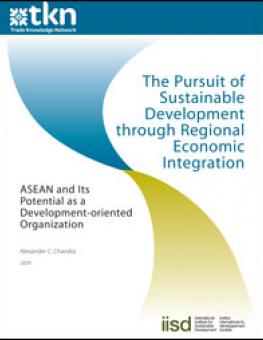
The Pursuit of Sustainable Economic Development through Regional Economic Integration: ASEAN and its Potential as a Development-oriented Organization
This report analyses the potential for the Association of Southeast Asian Nations (ASEAN) to function as a development-oriented organization. It departs from the developmental regionalism analysis that is currently emerging in the literature on regional integration. In the context of Southeast Asia such an analysis has been limited and can be further developed. The report focuses on ASEAN's economic integration initiatives and the extent to which they help advance its stated sustainable development objectives in the areas of poverty reduction, rural development, social protection and the environment.
Key findings:
-
While the region has seen significant economic growth, accompanied by a consistent rise in real per capita incomes over the past few years, poverty and the unequal distribution of income remain key problems.
-
Although ASEAN member states consider development and developmental regionalism important components of existing ASEAN regional economic integration initiatives, the extent to which the implementation of these initiatives reflects the developmental needs of the people in the region remains debatable.
Key recommendations:
-
Develop a balance between ASEAN's desire to adopt the principle of open regionalism and the organization's imperative of lifting millions out of poverty.
-
Ensure member countries provide the necessary political and economic commitments, such as an adequate social safety net, for the full implementation of their socio-economic initiatives to minimize the impacts of economic globalization and regionalization.
-
Reform the outdated principle of non-interference, which often hinders the progress of economic advancement in the region. This is crucial to the attainment of the organization's economic development goals. Poverty is a collective concern for all the member countries and as such could be better tackled collectively by ASEAN members.
-
Find ways to empower marginalized economic groups. In practice this might involve the recognition of the non-professional migrant labourers who are hired for the majority of inter-state employment in the region.
-
Encourage the emergence of economic solidarity in the region by developing economic complementarities among the region's economies and ensuring common regional policies and positions in wider multilateral forums.
-
Democratize the economic policy-making process by improving the quantity and quality of engagement between policy-makers and regional stakeholders.
You might also be interested in
Sustainable Asset Valuation of Sherwan Hill Adventure Park in Abbottabad, Pakistan
This report analyzes the social, economic, and environmental benefits of the Sherwan Hill Adventure Park in Pakistan.
December 2024 | Carbon Minefields Oil and Gas Exploration Monitor
In November 2024, 23 oil and gas exploration licences were awarded across five countries, with Russia granting the licences that account for the largest portion of embodied emissions.
Toward a Coherent, Transformative Approach to Financing Sustainable Development, Climate, and Nature
Four key proposals for the Fourth Financing for Development Conference (FfD4) to create an integrated, equitable approach to financing climate, nature, and development goals.
Green Public Procurement in India
This report analyzes the status of green public procurement (GPP) in India and suggests key strategies for advancing sustainable procurement practices.